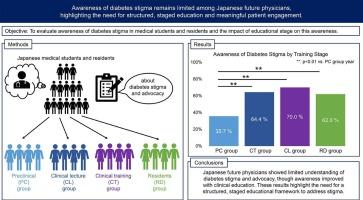Awareness of diabetes stigma and advocacy among future physicians: insights from the first real-world survey among medical trainees in Japan
IF 7.4
3区 医学
Q1 ENDOCRINOLOGY & METABOLISM
引用次数: 0
Abstract
Aims
Diabetes stigma is an important issue, and healthcare providers may inadvertently perpetuate it. However, the extent to which future physicians—medical students and residents—are aware of diabetes stigma and advocacy remains poorly understood. This first real-world study aimed to assess their understanding of diabetes stigma and advocacy and identify the needs for strategic interventions in medical education.
Methods
We conducted a questionnaire-based survey between July 2024 and March 2025 among medical students at three training stages (preclinical, clinical lectures, and clinical training group) and residents from two universities and university hospitals in eastern and western Japan.
Results
From 1607 potential participants, 921 responses were analyzed. Overall, 57·0% and 25·9% of participants reported awareness of diabetes stigma and advocacy, respectively. Awareness significantly increased with advancing training stage compared with the preclinical group (p < 0·01). Despite this trend, nearly half of them across all training stages had misconceptions and limited knowledge about diabetes.
Conclusions
Japanese future physicians demonstrated limited understanding of diabetes stigma and advocacy, although clinical education appeared to improve awareness. These findings highlight the need for a structured, multi-stage framework within medical education to more effectively address stigma and prepare future physicians to contribute to its eradication.

未来医生对糖尿病污名和倡导的认识:来自日本医学实习生的第一次真实世界调查的见解
目的糖尿病的污名是一个重要的问题,而医疗保健提供者可能会在不经意间使其永久化。然而,未来的医生——医科学生和住院医生——在多大程度上意识到糖尿病的污名和宣传仍然知之甚少。这是第一个真实世界的研究,旨在评估他们对糖尿病污名和宣传的理解,并确定医学教育中战略干预的需求。方法于2024年7月至2025年3月对日本东、西部两所大学及大学附属医院的临床前、临床讲座、临床实训组三个阶段的医学生和住院医师进行问卷调查。结果从1607名潜在参与者中,分析了921份反馈。总体而言,57.0%和25.9%的参与者分别报告了对糖尿病污名和宣传的认识。与临床前组相比,随着训练阶段的推进,认知水平显著提高(p < 0.01)。尽管有这种趋势,但在所有培训阶段,近一半的人对糖尿病存在误解和有限的知识。结论:日本未来的医生对糖尿病污名和宣传的理解有限,尽管临床教育似乎提高了认识。这些发现强调了在医学教育中需要一个结构化的、多阶段的框架,以更有效地解决耻辱问题,并为未来的医生做好准备,为消除耻辱做出贡献。
本文章由计算机程序翻译,如有差异,请以英文原文为准。
求助全文
约1分钟内获得全文
求助全文
来源期刊

Diabetes research and clinical practice
医学-内分泌学与代谢
CiteScore
10.30
自引率
3.90%
发文量
862
审稿时长
32 days
期刊介绍:
Diabetes Research and Clinical Practice is an international journal for health-care providers and clinically oriented researchers that publishes high-quality original research articles and expert reviews in diabetes and related areas. The role of the journal is to provide a venue for dissemination of knowledge and discussion of topics related to diabetes clinical research and patient care. Topics of focus include translational science, genetics, immunology, nutrition, psychosocial research, epidemiology, prevention, socio-economic research, complications, new treatments, technologies and therapy.
 求助内容:
求助内容: 应助结果提醒方式:
应助结果提醒方式:


